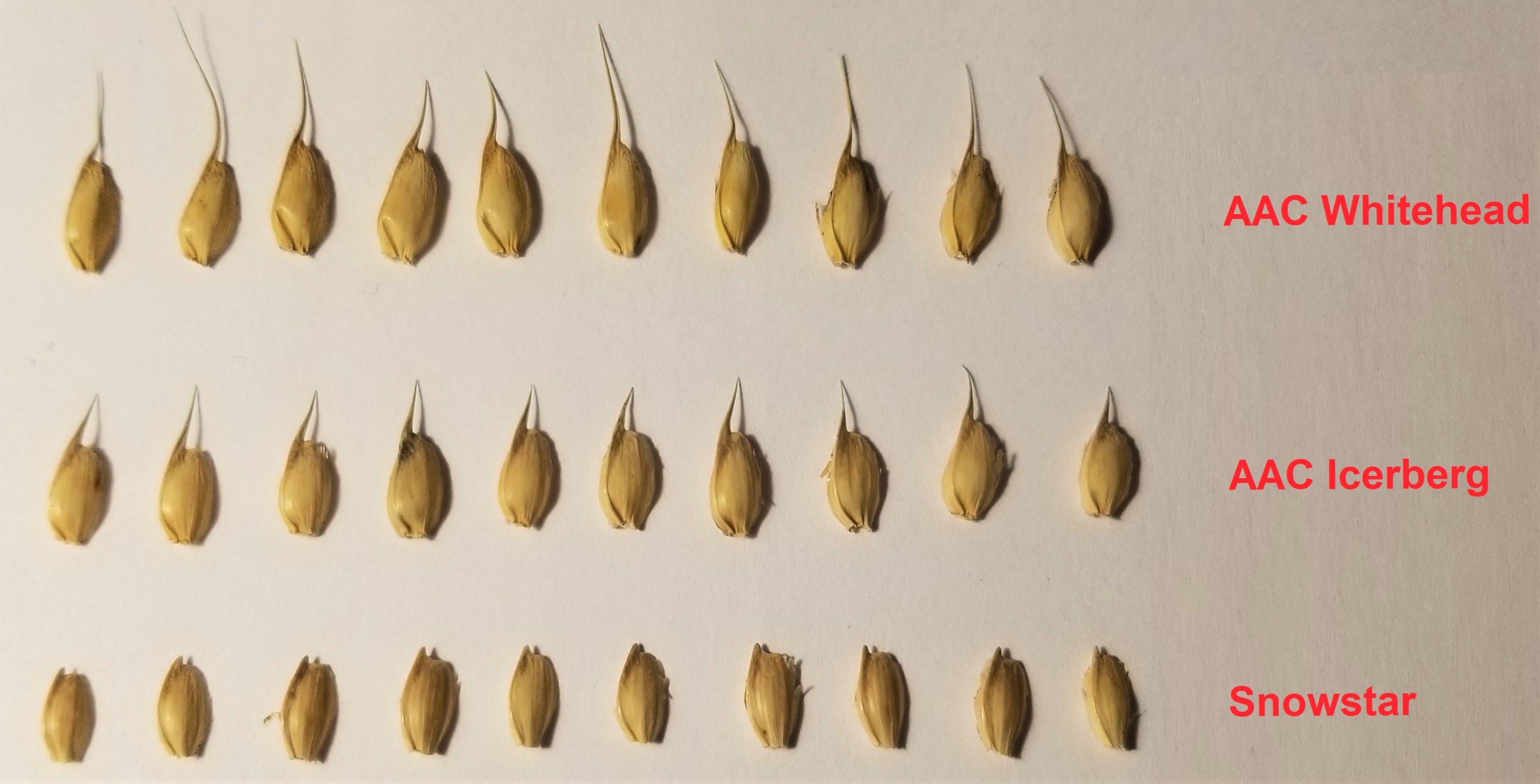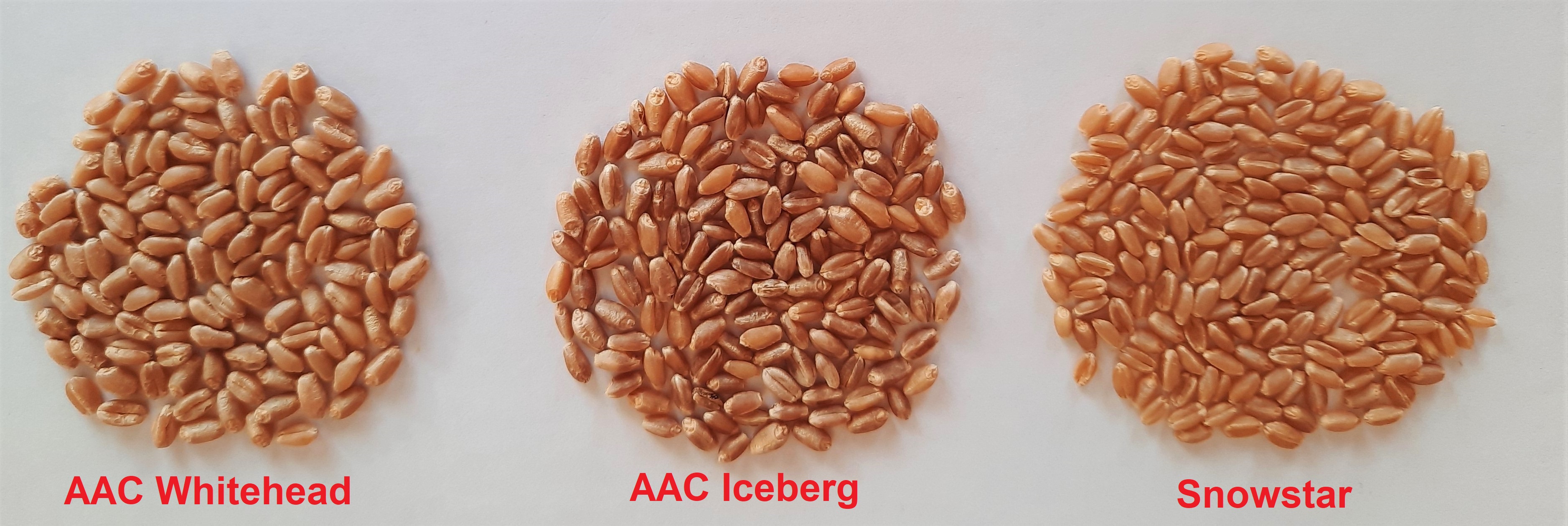AAC Whitehead
| Denomination: | 'AAC Whitehead' |
|---|---|
| Botanical Name: | Triticum aestivum |
| Applicant/Holder: |
Agriculture & Agri-Food Canada, Lethbridge Lethbridge Research Centre, 5403 - 1 Avenue, South P.O. Box 3000 Lethbridge, Alberta T1J 4B1 Canada |
| Breeder: |
Harpinder S. Randhawa, Agriculture & Agri-Food Canada, Lethbridge, Alberta |
| Agent in Canada: |
Agriculture & Agri-Food Canada Office of Intellectual Property and Commercialization c/o Shannon Whyte 107 Science Place Saskatoon, Saskatchewan S7N 0X2 Canada Tel: (204) 999-9887 |
| Application Date: | 2020-12-14 |
| Provisional Protection:: | 2020-12-14 |
| Application Number: | 20-10400 |
| Grant of Rights Date: | 2022-11-21 |
| Certificate Number: | 6682 |
| Grant of Rights Termination Date: | 2042-11-21 |
Variety Description
Varieties used for comparison: 'AAC Iceberg' and 'Snowstar'
Summary: At heading, the plants of 'AAC Whitehead' are shorter than those of 'AAC Iceberg' and 'Snowstar'. The spike of 'AAC Whitehead' has an erect attitude while the spike of 'AAC Iceberg' has an inclined attitude. The lower glume shoulder of 'AAC Whitehead' is narrow and sloping while the lower glume shoulder of 'AAC Iceberg' is of medium width and slighlty sloping and that of 'Snowstar' is broad and straight. The lower glume of 'AAC Whitehead' is narrow while the lower glume of 'AAC Iceberg' is of medium width. The lower glume of 'AAC Whitehead' has a long to very long beak while the lower glume of 'AAC Iceberg' has a beak of medium length and that of 'Snowstar' has a very short beak. The kernel weight of 'AAC Whitehead' is greater than that of 'AAC Iceberg'.
Description:
PLANT: spring type, common wheat, erect growth habit at 5 to 9 tiller stage, low frequency of plants with recurved flag leaves, heads mid-season, matures mid-season
SEEDLING (4-leaf stage): absent or very weak intensity of anthocyanin colouration of coleoptile, glabrous sheath and blade of lower leaves
FLAG LEAF: absent or very weak intensity of anthocyanin colouration of auricles, absent or very weak glaucosity of sheath, absent or very weak glaucosity of lower side, glabrous blade and sheath
CULM: absent or very sparse hairiness on uppermost node, absent or very weak to weak glaucosity, straight neck
STRAW: pith of medium thickness in cross-section, no anthocyanin colouration at maturity
SPIKE: weak glaucosity at heading, tapering shape in profile, dense, white at maturity, erect attitude, absent or very sparse hairiness of convex surface of apical rachis segment
AWNS: equal to length of spike, white at maturity
LOWER GLUME: medium to long, narrow, glabrous, sparse extent of internal hairs
LOWER GLUME SHOULDER: narrow, sloping
LOWER GLUME BEAK: long to very long, slightly curved
LOWEST LEMMA: straight beak
KERNEL: hard white, medium in size, medium length, medium width, oval, rounded cheek, short brush hairs
GERM: medium sized, round, narrow crease of shallow depth
AGRONOMIC TRAITS: good resistance to shattering, fair resistance to pre-harvest sprouting, good bread making quality
DISEASE REACTIONS: resistant to Leaf rust (Puccinia triticina), Stem rust (Puccinia graminis), Stripe rust (Puccinia striiformis); moderately resistant to Fusarium head blight (Fusarium graminearum), Common bunt (Tilletia sp.)
INSECT REACTION: resistant to Wheat Midge (Sitodiplosis mosellana)
Origin & Breeding History: 'AAC Whitehead' (experimental designations HW506 and W13798) originated from a three-way cross conducted between 'AAC Iceberg', 'Carberry' and 'Vesper' at the AAFC Lethbridge Research and development Centre in Lethbridge, Alberta in 2012. F1 derived double haploids were produced using maize hybridization techniques and 280 of the resulting DH lines were evaluated in a contra-season nursery in Leeston, New Zealand in 2013-2014. 165 of the resulting rows were harvested and further evaluated as single replicate yield trials in both irrigated and dryland sites and disease nurseries in Lethbridge, Alberta. In 2015, 16 lines were advanced to replicated yield trials in Lethbridge, Alberta, Bow Island, Alberta and Melfort, Saskatchewan and evaluated in disease nurseries. In 2016, 8 lines were advanced to replicated trials in multiple locations within Alberta, Manitoba and Saskatchewan. One line designated as W13798 was advanced to the 2017 Hard White Wheat Registration Trial as HW506 and was evaluated from 2017 to 2019. Selection criteria included plant type, plant height, maturity, yield, disease resistance and quality traits.
Tests & Trials: The comparative trials for 'AAC Whitehead' were conducted at the Fairfield Farm, Agriculture and Agri-Food Canada in Lethbridge, Alberta in 2020 and 2021. There were 3 replicates per variety arranged in an RCB design. Plots consisted of 4 rows, each row was 3 metres long with 0.23 metre inter-row spacing. The seeding density was 250 seeds per squared metre, resulting in approximately 2100 plants per variety per year. Measured characteristics were based on 20 measurements per variety per year except for kernel weight which was based on 10 measurements per variety per year. Mean differences were significant at the 5% probability level based on a paired Student's t-test.
Comparison tables for 'AAC Whitehead' with reference varieties 'AAC Iceberg' and 'Snowstar'
Plant height (at maturity, including awns) (cm)
| 'AAC Whitehead' | 'AAC Iceberg' | 'Snowstar' | |
|---|---|---|---|
| mean 2020 | 89.7 | 105.7 | 97.2 |
| std. deviation 2020 | 3.6 | 3.2 | 3.5 |
| mean 2021 | 80.5 | 93.3 | 82.7 |
| std. deviation 2021 | 2.8 | 3.2 | 2.8 |
Kernel weight (grams per 1000 seeds)
| 'AAC Whitehead' | 'AAC Iceberg' | 'Snowstar' | |
|---|---|---|---|
| mean 2020 | 36.3 | 35.3 | 28.1 |
| std. deviation 2020 | 0.6 | 0.5 | 0.4 |
| mean 2021 | 41.2 | 39.0 | 40.7 |
| std. deviation 2021 | 0.6 | 0.4 | 0.7 |
Click on image for larger view

Wheat: 'AAC Whitehead' (top) with reference varieties 'AAC Iceberg' (centre) and 'Snowstar' (bottom)
Click on image for larger view

Wheat: 'AAC Whitehead' (left) with reference varieties 'AAC Iceberg' (centre) and 'Snowstar' (right)
- Date modified: